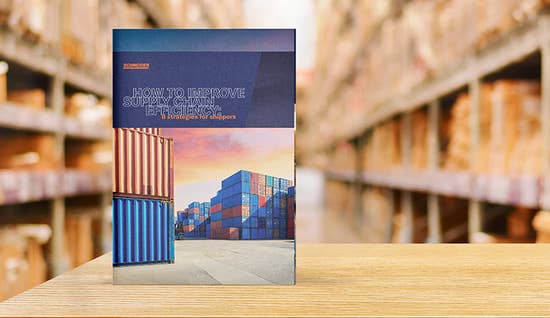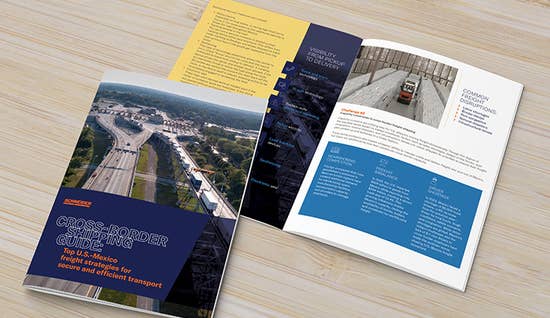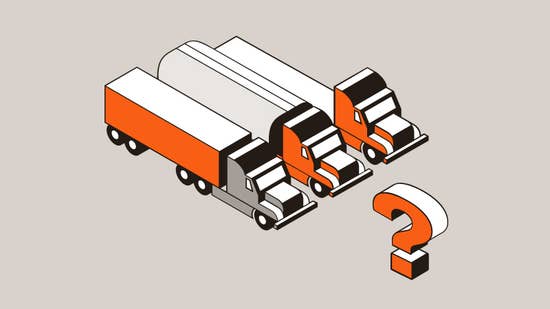Best practices
ShipperBest practices
How to improve supply chain efficiency: 8 strategies for shippers
The benefits of an optimized supply chain are in reach. Discover how to improve supply chain efficiency with proven success stories – Download your guide today!
ShipperBest practices
Guide to reduce supply chain costs and withstand dynamic markets
Unlock industry-leading strategies to reduce supply chain costs and boost efficiency. See how other businesses achieved cost savings.
ShipperBest practices
Cargo theft prevention guide: 6 essential security tactics
Protect your freight with these multi-layered cargo theft prevention strategies. Learn how to secure your supply chain, reduce risks and safeguard valuable goods.
ShipperBest practices
Cross-border shipping guide: Top U.S.-Mexico freight strategies
Navigate cross-border challenges, enhance security and help ensure an efficient and seamless cross-border shipping strategy with this guide.
ShipperBest practices
E-commerce logistics: Key to customer satisfaction
U.S. e-commerce sales have hit record highs. Meeting market demands for lightning-fast, faultless order fulfillment for unbeatable customer satisfaction is the standard. Getting it wrong is a mistake you can’t afford to make. In this article, we discuss the process of e-commerce logistics as well as important strategies to consider.
ShipperBest practices
The essential guide to achieving supply chain visibility
Get a comprehensive understanding of supply chain visibility, its importance and ways to achieve real-time transparency in your supply chain.
ShipperBest practices
What is 3PL? The ultimate guide to third-party logistics
Discover the world of third-party logistics and how partnering with one can optimize your supply chain and drive business growth. Read our guide now.
ShipperBest practices
Fleets will need to navigate powertrain options amid green push
Fleet operators will continue to have a variety of truck powertrain choices in the future as stricter emission regulations and shippers’ demand for environmentally sustainable freight continues to grow in popularity and concern.
ShipperBest practices
Five steps to reduce shipping emissions and improve sustainability
Emissions associated with transportation and shipping are one of the largest sources of greenhouse gas (GHG) emissions for many companies, so optimizing supply chains and the transport of goods is key to meeting sustainability goals.
ShipperBest practices
Best practices for working with your shipping provider during peak and promotional surges
Getting hot items into the hands of the people who need them most isn’t as easy as simply loading the trucks and sending them on their way. The key to thriving during peak and promotional freight seasons is to have a knowledgeable and solutions-oriented transportation provider in place that’s equipped to handle the surges and tight timelines.
ShipperBest practices
6 questions to ask when looking for a low-density freight shipping solution
If you’re looking for a solution for low-density or hard-to-predict freight, it’s important to find a shipping provider that meets your needs. Here are six questions to ask to make sure a provider’s right for your business.
ShipperBest practices
What to look for in a food and beverage carrier
When error can lead to contamination or spoilage, you need a food and beverage shipping provider you can trust. Learn what to look for in a food-grade carrier.
ShipperBest practices
6 tips on how to safely ship temperature-sensitive freight
As extreme temperatures become the norm, shippers need to control for what they can more than ever when shipping temperature-sensitive freight. Learn how to move your freight safely in hot or cold weather.
ShipperBest practices
Loading guide for intermodal containers moving to California and Nevada
Understand the restrictions and challenges for shippers and consignees in California and Nevada due to California's bridge law
ShipperBest practices
The benefits of shipping refrigerated freight with a dedicated provider
To help ensure an uninterrupted supply chain, using a dedicated provider can solve the biggest food and beverage challenges that put refrigerated freight — and the bottom line — at risk.
ShipperBest practices
What is dedicated transportation?
By definition, a dedicated freight solution provides contracted, consistent capacity for your business’ shipping requirements. But the benefits don’t have to end there.
ShipperBest practices
What to look for in a dedicated carrier
There are a variety of factors to consider when selecting a dedicated carrier, but identifying the best provider for your unique needs will not only optimize the way you ship but add value across your business.
ShipperBest practices
Top reasons businesses choose Schneider flatbed shipping
Protect your cargo. Improve deliveries. Grow your business. These are the reasons why companies are choosing Schneider's dedicated flatbed shipping service-- the best flatbed transportation in the industry.



























